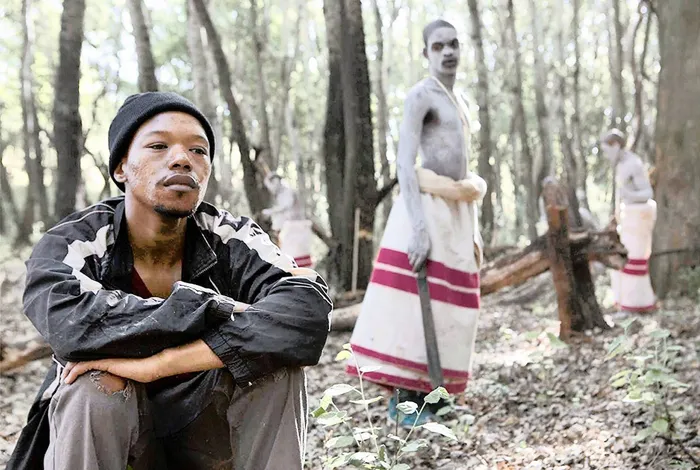Inxeba as afroporn from outer space

Nakhane Touré stars in ‘Inxeba’ as Xolani, a forklift operator in a warehouse who seems to live a very lonely and not very prosperous life. Nakhane Touré stars in ‘Inxeba’ as Xolani, a forklift operator in a warehouse who seems to live a very lonely and not very prosperous life.
It has been a few weeks since the controversy surrounding the film Inxeba ( The Wound) took a turn when Gauteng High Court Judge Joseph Raulinga set aside a Film and Publication Board Appeals Tribunal decision severely limiting distribution of the film. The post-judgment calm provides an opportunity to think anew about the meaning of the film beyond its regulation.
Of course, Inxeba is the 2017 film by South African director John Trengrove. It tells the story of three black men participating in the Xhosa ulwaluko (initiation) ritual in a rural part of Eastern Cape. (Circumcision as sign of manhood critical to the initiation ritual.) In the film, Xolani (Nakhani Touré), charged with caring for a young initiate named Kwanda (Niza Jay Ncoyini), quickly learns that Kwanda is gay. Kwanda, in turn, discovers that Xolani too is gay and is, indeed, involved in a relationship with Vija (Bongile Mantsai) who is another another initiation school caregiver.
Xhosa “traditionalists” protested the film’s release leading to violence at theatres and subsequent cancelled screenings. Protesters claimed that the film denigrated a sacred Xhosa ritual.
Regulation of the film’s distribution by the Film and Publication Board (FPB) and its Appeals Tribunal is telling particularly as regulation intersects, at a certain point, with more specific reasons why “traditionalists” wanted the film withdrawn. The FPB initially rated the film 16LS which marked the film as inappropriate for viewers under 16 years of age because of language (L) and sex (S).
“Traditionalists” appealed this rating. Appellants, including a traditional leader civic association and another organization interestingly named the Man and Boy Foundation, objected to the initial rating primarily for the following reasons: inaccurate depiction of the ritual and initiation schools; content too mature for minors; state funders of the film approved content that was vulgar and “blasphemous;” alcohol and drug abuse; language degrading to Xhosa women and girls.
The Appeals Tribunal only heard from the “traditionalists” during the actual appeal hearing, who Judge Raulinga determined had no standing to appeal; Inxeba producers and distributors were kept in the dark about the hearing until the last moment. Appeals Tribunal members gave Inxeba the kiss of death in terms of commercial viability in South Africa: They reclassified the film to X18 from the initial 16LS. X18 meant Inxeba would have to be classified as pornographic even though sex depicted in the film is not much more explicit than what South Africans can see on the raciest of soapies.
What does it mean when a state entity like the Appeals Tribunal deems same-sex sexuality pornographic in the absence of sex?
By the FPB’s own admission, Inxeba is the first non-pornographic film classified as pornographic. Which is an important admission, when, there is, according to the FPB, only “moderate” sexuality with degrees of nakedness but no explicit sex or genitals in any frame.
To some, deeming Inxeba as pornographic makes same-sex intimacy virtual afroporn—somehow reflecting a taboo “lifestyle” that may as well be from outer space instead of from our community. To others, insistence on the pornographic label by those leading the campaign against Inxeba makes Inxeba opponents seem like enemies of “modern” culture not contributors to the culture we make together.
However, Inxeba is about more than how those taking a stance have been portrayed. The film’s significance also rests beyond the constitutional perspective presented by Judge Raulinga when reading the case as contest pitting free speech rights against cultural rights of traditional communities.
Specifically, in defense of “tradition,” the executive director of the Man and Boy Foundation, Nkululeko Nxosi, insists that “traditionalist” concern about Inxeba has nothing to do with homosexuality per se. The issue for “traditionalists,” according to Nxosi, has everything to do with sex and sexuality being injected into the context of ulwaluko—heterosexual or homosexual sex and sexuality.
To complicate Inxeba and “tradition,” it is useful to turn to a 2016 study by Anathi Ntozini and Hlonelwa Ngqangweni. The two University of Fort Hare researchers interviewed gay undergraduates (some out and some not) who had been ulwaluko participants. Some who were out about their sexuality at initiation school were harassed. Others expressed themselves in more heteromasculinist terms to “pass.” There were also out initiates in the study including one openly visited by a boyfriend during ulwalukowithout negative consequence.
Perhaps the “tradition” that we have understood to be at the centre of the Inxeba controversy is not what it used to be. And maybe it never was what we thought of it in the first place.
*Patrick Lynn Rivers is a political scientist who has written extensively about media regulation in South Africa.